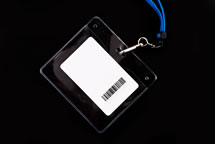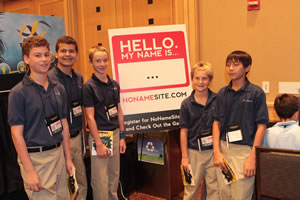
How can schools accurately measure and categorize a student’s 21st-century skills? The MacArthur Foundation hopes to solve this problem with a new competition that calls on participants to create what is known as a “digital badge.”
Digital badges and the digital badge system would, advocates say, help define the skills and knowledge students pick up in an informal way, such as through internships, online courses, open courseware, competitions, and much more.
Mozilla, which is partnering with the MacArthur Foundation to announce the $2 million Digital Media and Learning Competition, said the badge system “will let you gather badges from any site on the internet, combining them into a story about what you know and what you’ve achieved. … This sort of badge collection may eventually become a central part of [one’s] online reputation, helping you get a job, find collaborators, and build prestige.”
The competition calls for leading organizations, learning and assessment specialists, designers, and technologists to create and test digital achievement badges and badge systems. It will “explore ways digital badges can be used to help people learn and demonstrate their knowledge … [and] open new pipelines to talent,” the MacArthur Foundation said in a statement.
The competition is supported by a MacArthur grant to the University of California, Irvine and administered by the Humanities, Arts, Science, and Technology Advanced Collaboratory (HASTAC). It will be split into two competitions:
1. The badges competition: Badges for Lifelong Learning (awards ranging from $10,000 to $20,000) is designed to encourage individuals and organizations to create digital tools that support, identify, recognize, measure, and account for new skills, competencies, knowledge, and achievements for 21st-century learners wherever and whenever learning takes place. The deadline is Oct. 14.
2. The research competition: Badges, Trophies, and Achievements (awards from $5,000 to $80,000) focuses on online networks, digital resources, and gaming environments that provide rich opportunities for demand-driven, learner-centered learning. Projects must include knowledge communities, online tutorials, and other digital resources for wide-ranging learning needs. The deadline is Nov. 28.
According to the U.S. Department of Education (ED) and the Obama administration, a digital badge system could revolutionize education across the country.
Education Secretary Arne Duncan recently said during the MacArthur Foundation’s announcement: “We’re excited that … this competition will serve as a catalyst to advance the potential of digital badges. Badges can help engage students in learning and broaden the avenues for learners of all ages to acquire and demonstrate—as well as document and display—their skills.”
Duncan explained that digital badges could help speed the shift from seat-time credentials and help support “anytime, anywhere” learning, or experiences gained in online or physical environments, schools, adult education centers, and community settings.
Duncan also pointed out that “badges empower students and teachers to play an even stronger role in their own learning and development—to seek out the right tools among many resources available, and in their fields of interest—and build a record of what they have mastered.”
Teachers, said Duncan, could use badges to help advance their careers and mark capacity-building milestones. The badges can “support American’s new and veteran teachers, and help them achieve the professional growth we know they seek,” he said.
Duncan also praised TopCoder, a company that serves as an online virtual community of more than 300,000 software developers and “digital creatives” around the world.
TopCoder, an adviser for the competition, currently has a badge system for its community members that validates digital skills and competencies, and it serves as an example of how ratings and stats in a competitive environment can work at the highest level.
Computer programmers can demonstrate skills in different company-based competitions through TopCoder’s community platform, qualifying them for “good jobs with high-paying salaries at fast-growing companies like Google and Facebook,” said Duncan.
“Everything we do in terms of work and activities is based on competition and metrics,” said Jim McKeown, director of communications for TopCoder, in an interview with eSchool News. “When a competitor participates in an activity, be it for fun or money, a range of metrics is captured at different stages of the competition—and is publicly available for all to see in what is essentially a digital baseball stats card.” (Click here for an example.)
McKeown explained that the most “telling” information on the member’s card is the member’s rating, which shows his or her overall standing in the community across various competitions as an individual. “This is the essence of the TopCoder badging system,” he said.
TopCoder believes that the MacArthur Foundation’s take on the badge system–creating a competition to find the best solution, as well as assigning digital badges to students—is a good idea, because by entering into a competitive environment, “participants understand they must bring their ‘A’ game—they must produce their best effort,” explained McKeown.
Badges and beyond
TopCoder is practicing what it preaches not just through its platform, but by hosting the “World Championship of Computer Programming,” a competition for computer programmers that also supports computer science and science, technology, engineering, and math (STEM) activities and challenges for K-12 students.
During this recent event, held in Fort Lauderdale, Fla., TopCoder—which partners with NASA and the Defense Advanced Research Projects Agency—unveiled NoNameSite.com, which aims to “empower kids to exercise and develop their minds through games and challenges in a competitive, but safe, online environment,” said the company.

The site aims to become a top destination for the sixth through 12th grade demographic by “providing an ever-changing range of dynamic and fun activities that have the potential to develop innovative thinking and become building blocks for increasing complex CS-STEM-centric challenges,” said McKeown.
According to McKeown, measurement and value analysis programs will be matched with incentives and digital badges to maintain long-term player engagement.
The platform is expected to be a fully self-sustaining commercial entity by late 2012.
TopCoder also is working with NASA on an online platform called the NASA Tournament Lab (NTL), which was built by the TopCoder community in partnership with MIT. One of the first events of this lab is a competition called Zero Robotics—a robotics programming competition where the robots are SPHERES (Synchronized Position Hold, Engage, Reorient, Experimental Satellites) inside the International Space Station (ISS).
Students program the satellites to play a challenging game and can create, edit, share, save, simulate, and submit code, all from a web browser on the NTL site.
All tournaments are free, and all that’s needed to participate, said McKeown, is a team, mentorship, and the internet. An astronaut will conduct the championship competition in microgravity with a live broadcast from the ISS.
“There is widespread recognition that the U.S. faces a shortfall in qualified capable technologists in the very near future,” said McKeown. “Colleges and higher education are simply not graduating enough technology majors and traditional teaching systems are not able to respond quickly. Unless we embrace novel and innovative approaches to bolster the ranks of young people interested and engaged in critical thinking and analytical skills activities, we will have a problem of national importance, one that will impact our national security and prosperity.”
Duncan said the administration believes so much in the power of digital badges to help spur innovation that the Department of Veterans Affairs Innovation Initiative will join the effort with a commitment to award a $25,000 prize for the best badge concept and prototype that serves veterans seeking good-paying jobs in today’s economy.
The competition, part of the MacArthur Foundation’s and Mozilla’s competition, will be called the “Badges for Heroes Challenge.”
- #4: 25 education trends for 2018 - December 26, 2018
- Video of the Week: Dealing with digital distraction in the classroom - February 23, 2018
- Secrets from the library lines: 5 ways schools can boost digital engagement - January 2, 2018

Comments are closed.